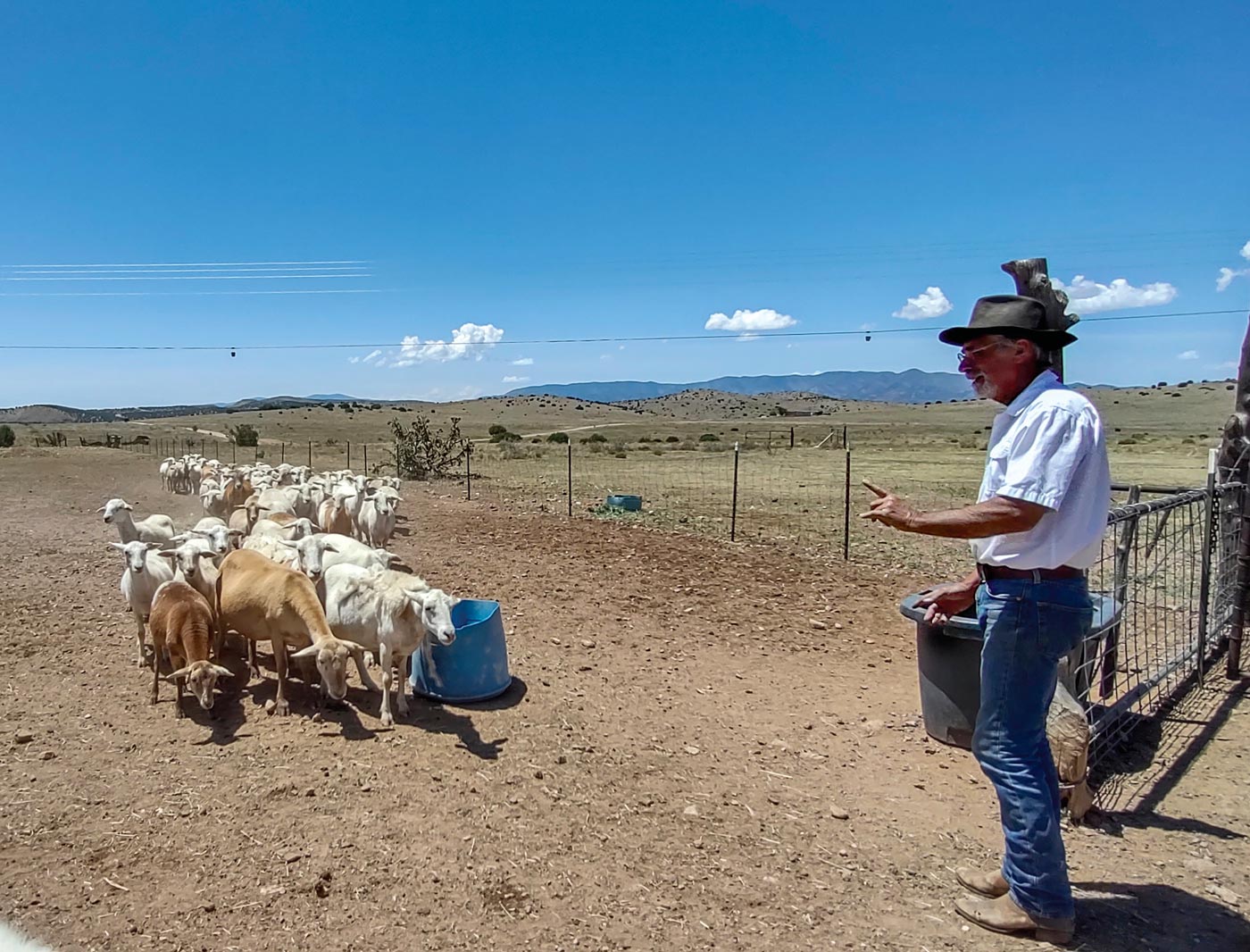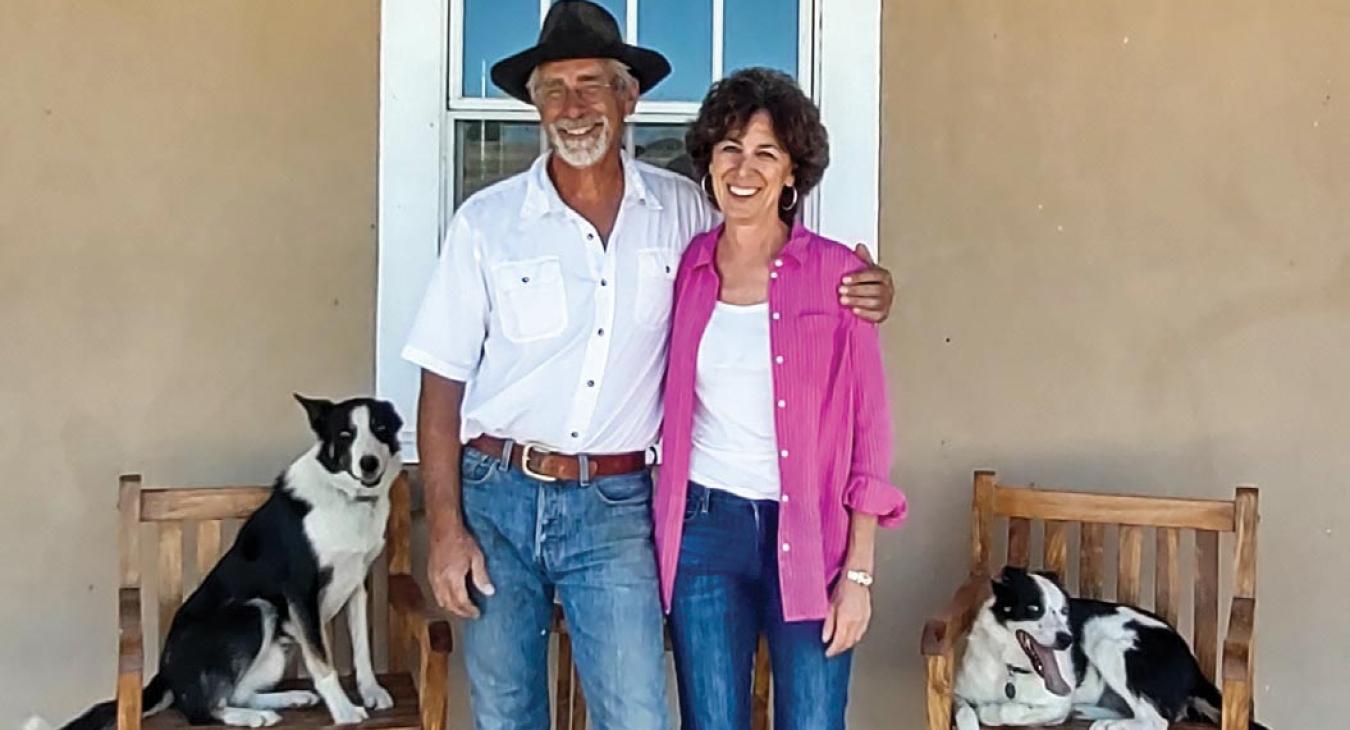Pete Ditmars and Jessica Aberly run Dunhill Ranch, providing meat to hungry mouths around the state.
Story and photos by Chris Eboch
Some people grow up in ranch families, but Pete Ditmars chose the work after years of running his own computer software company.
“I was working inside all day, and I wanted to get outside more,” he says. “I like animals and wanted to work with them. Rather than create software on tight deadlines that became outdated as soon as it was released, I wanted to take the time to do things right, and I love creating a product—grass-fed lamb and beef—that people truly enjoy.”
Today, he runs Dunhill Ranch with his wife, Jessica Aberly, and they provide meat to restaurants and individuals across the state.
In 1997, Pete and Jessica bought land in central New Mexico, near Magdalena. They built their home and numerous outbuildings themselves over the course of a decade.
Jessica, a lawyer in Albuquerque, came down every week in the early years to help with construction. She is now full time at the ranch but still practices law, working with some Pueblos.
Growing the ranch took time.
“We started very small,” Pete says. “We only offered lamb at that time and only sold direct to customers.”
To grow, Pete and Jessica put up posters and advertised in the paper. Word of the business spread fast, and restaurants started calling. Now, they supply meat to restaurants Frenchish in Albuquerque and Tumbleweeds in Magdalena.
In autumn, they sell at farmers markets in Socorro and Albuquerque, which brings a perk. “We’ve met so many cool people,” Jessica says.
“We have so many friends we met through the markets.”
“It’s good for our business and good for our social life,” Pete says.
Word-of-mouth keeps working, too.
“People serve our meat at a gathering and guests say, ‘This is really good. Where did it come from?’” Pete says.
It’s also becoming more common for people to visit the ranch to pick up meat or a live lamb.
“We try to keep it as close to home as possible,” Pete says.
Lamb and beef are only available for sale in the fall. Dunhill Ranch often sells out of specific cuts of meat quickly, so email reservations help manage expectations.
To keep the ranch running, Pete must be a jack of all trades. “Plumber, electrician, carpenter, welder, heavy equipment operator, mechanic, mason, veterinarian, farrier, gardener, computer technician, web designer, accountant, dog trainer and Mr. Fix It for just about anything from a toaster to a backhoe,” he says.
His parents often made things themselves and thought broken items should be fixed rather than discarded. Pete learned the lesson and enjoys making special items in his forge.
“He’s a problem solver and super handy,” Jessica says. “If you live on a ranch, you have to fix everything, make everything, invent everything. There’s always going to be a problem to solve.”
For Pete, that’s an advantage.
“I get to choose how it’s done and see it done right,” he says. Rural living has attracted other city folks to the area in recent years, but they don’t always realize just how isolated it is.
“It’s not for everyone,” Pete says.
For those who enjoy that lifestyle, the Magdalena area provides a community where people call each other for advice and help. Many neighbors have specialized skills such as rounding up cattle or branding, so people work together on those big jobs.
Socorro Electric Cooperative helps as well.
“Since we’re rural, I know the guys who come out and fix problems if there’s a storm,” Pete says. “They’re very responsive. They usually know about the problem before I do.”
While the demand for their meat keeps growing, they don’t want to expand the ranch much more. Pete and Jessica have three priorities. First is keeping the fragile high desert land healthy.
“If you don’t have healthy land, you don’t have a viable business,” Pete says. “The land can only support a limited number of animals per square mile.”
Pete buys yearling steers from a neighbor each year based on what he thinks the grass can support. The land receives natural fertilization and rest periods in between grazing.
The second priority is taking care of the animals. The sheep and steers roam the land, enjoying fresh air, exercise and grass. Two Great Pyrenees dogs stay with the sheep and protect them. The cattle and sheep are grass-fed from weaning until butchering, supplemented with quality alfalfa and grass hay during snowy winters. Pete and Jessica say this natural diet and exercise produces meat that is lean, tender and flavorful—much better than the typical feedlot animals. If an animal gets sick and needs medicine, it isn’t sold to customers.
“We want our meat to be as natural as possible,” Pete says. “These animals live as good a life as anyone could give them.” The third priority is producing a quality product.
“We have something that we completely believe in, and what we do is appreciated,” Jessica says. “The object isn’t to grow endlessly. It’s to have a sustainable business that two people can manage.”
The ranch may only have two human workers, but Pete says they rely heavily on their dogs, including border collies that move the sheep to and from pastures to graze. When joining them in the field, Pete has an all-terrain vehicle but prefers working from his horse.
“I’m all for modern conveniences, but I like quiet,” he says. “I like physical labor. I like training and working with the dogs.”
Pete and Jessica have four nephews who have done “work-cations” on the ranch. The couple hopes one of them will take over someday, but they’re not looking to retire anytime soon.
“We’re going to try to stay here doing what we’re doing as long as we are able,” Pete says.
Dunhill Ranch sells lamb and beef in the fall. Find it at the Downtown Growers’ Market in Albuquerque on Saturday mornings and at the Socorro Farmers Market on Tuesday evenings. The ranch offers home delivery in the Rio Grande Valley between San Antonio, NM and Santa Fe. Visit www.dunhillranch.com for more information, including recipes for items such as Turkish lamb kebabs and beef Burgundy, or email Sales@DunhillRanch.com.


